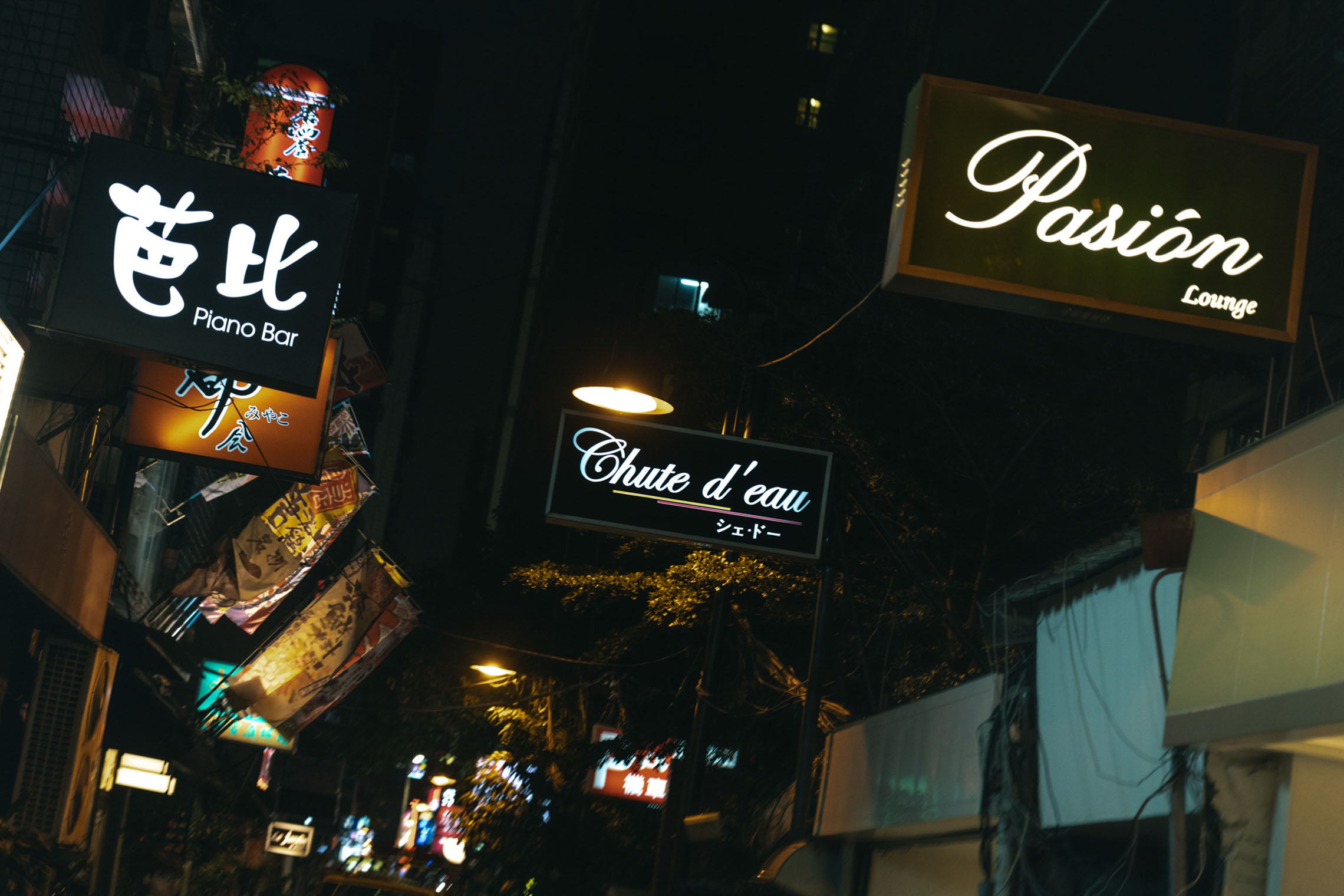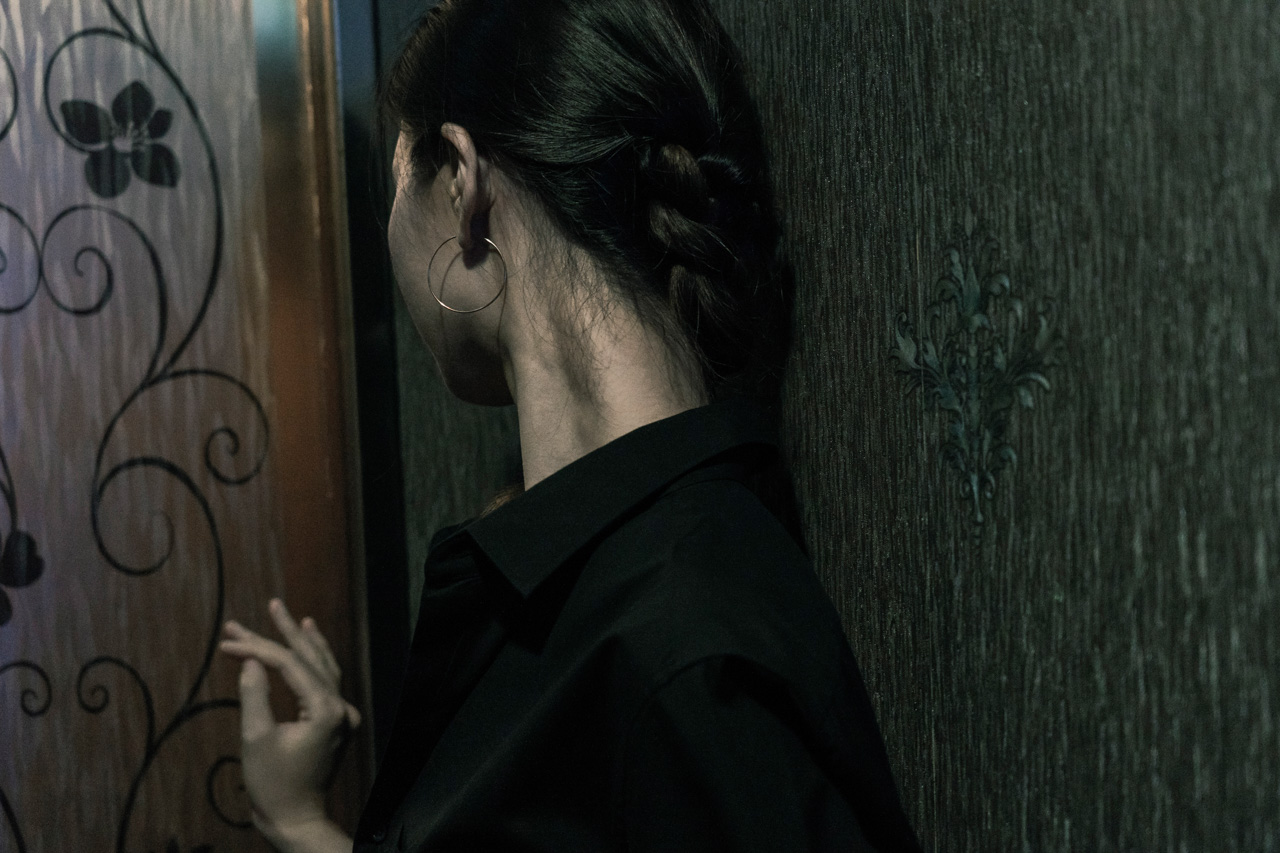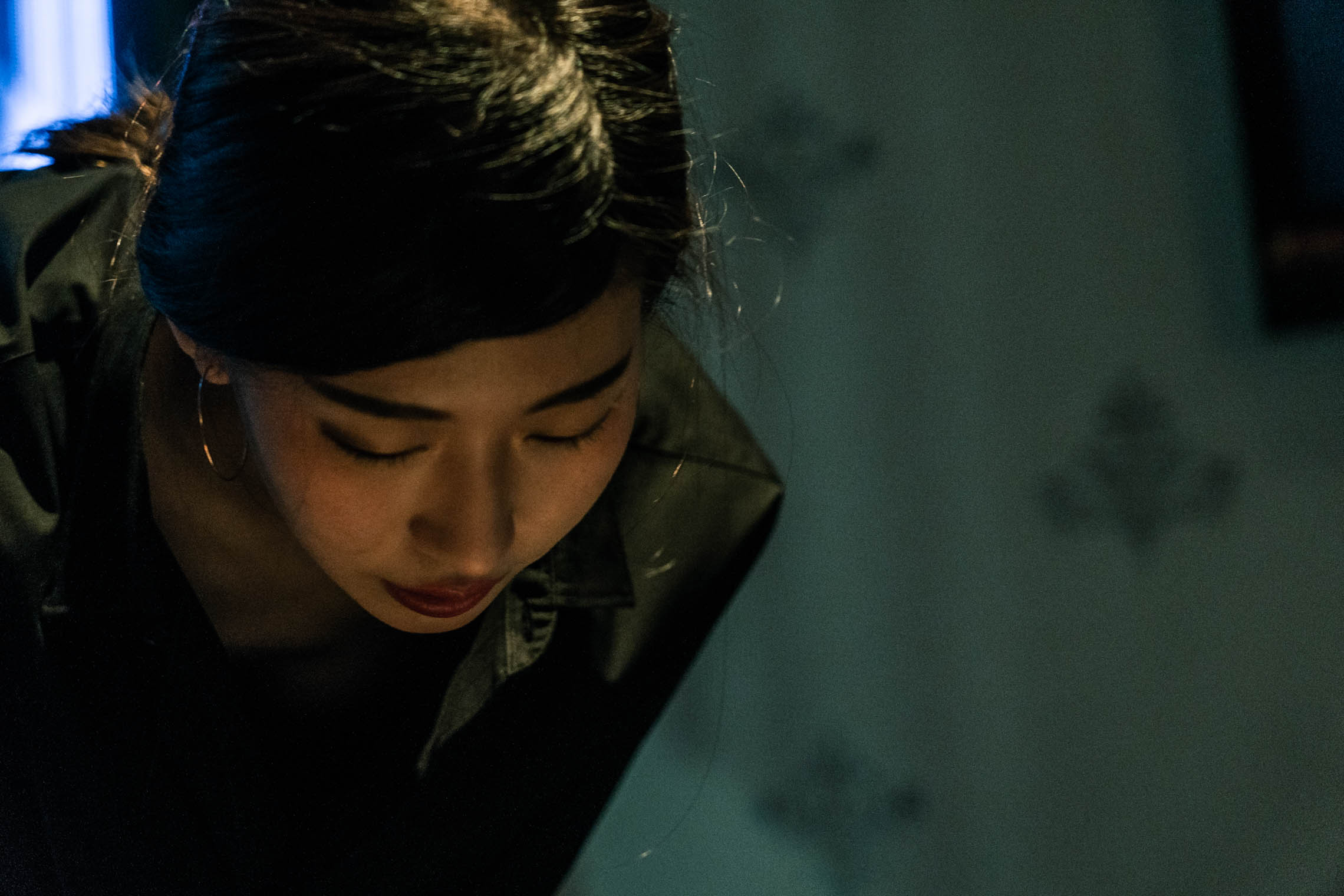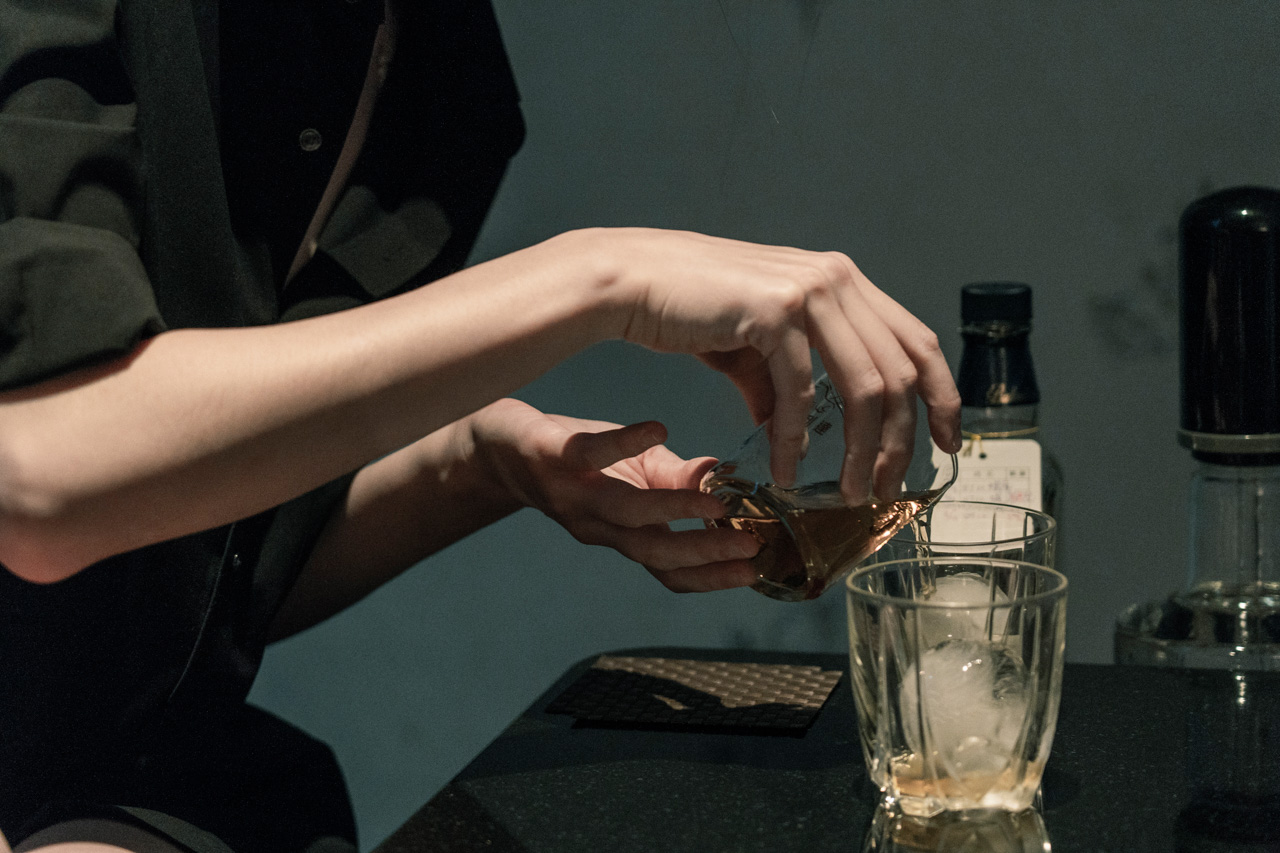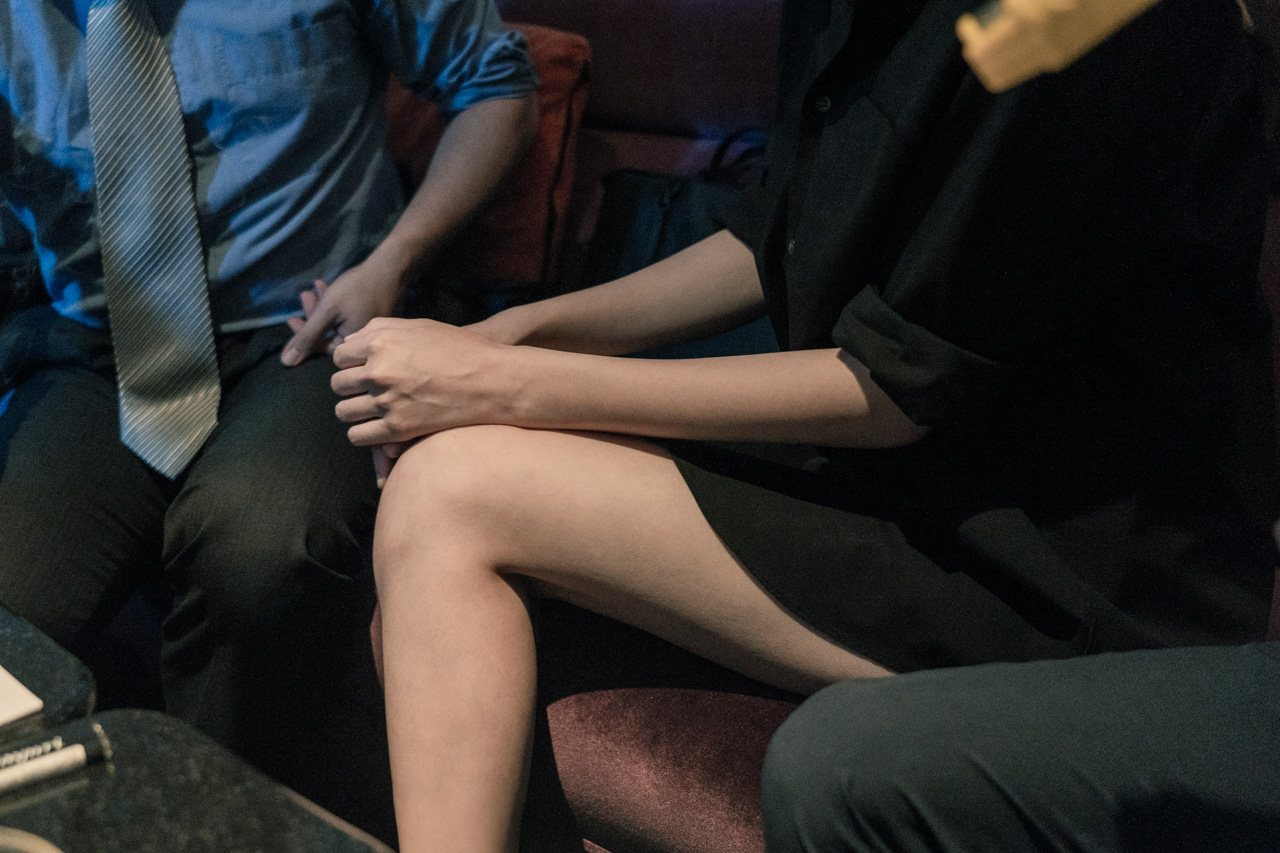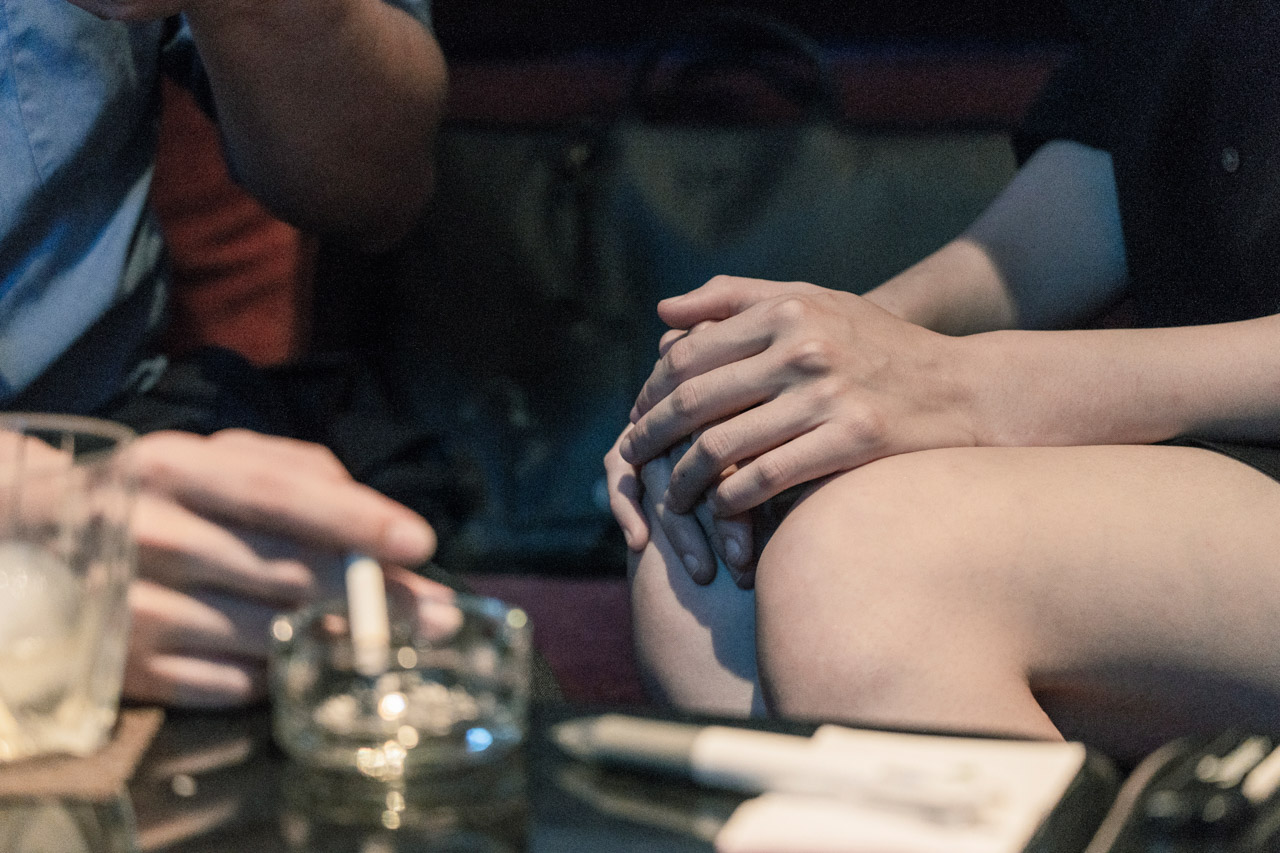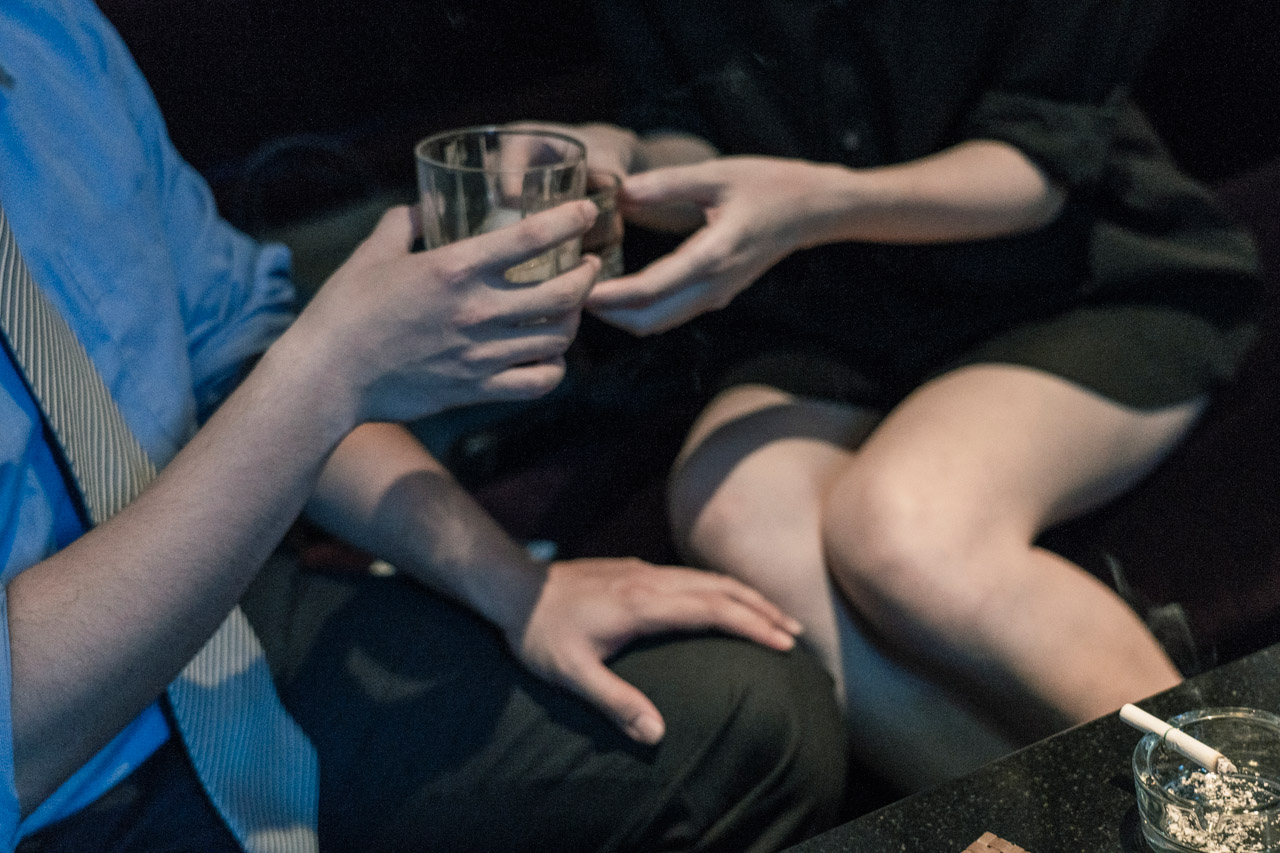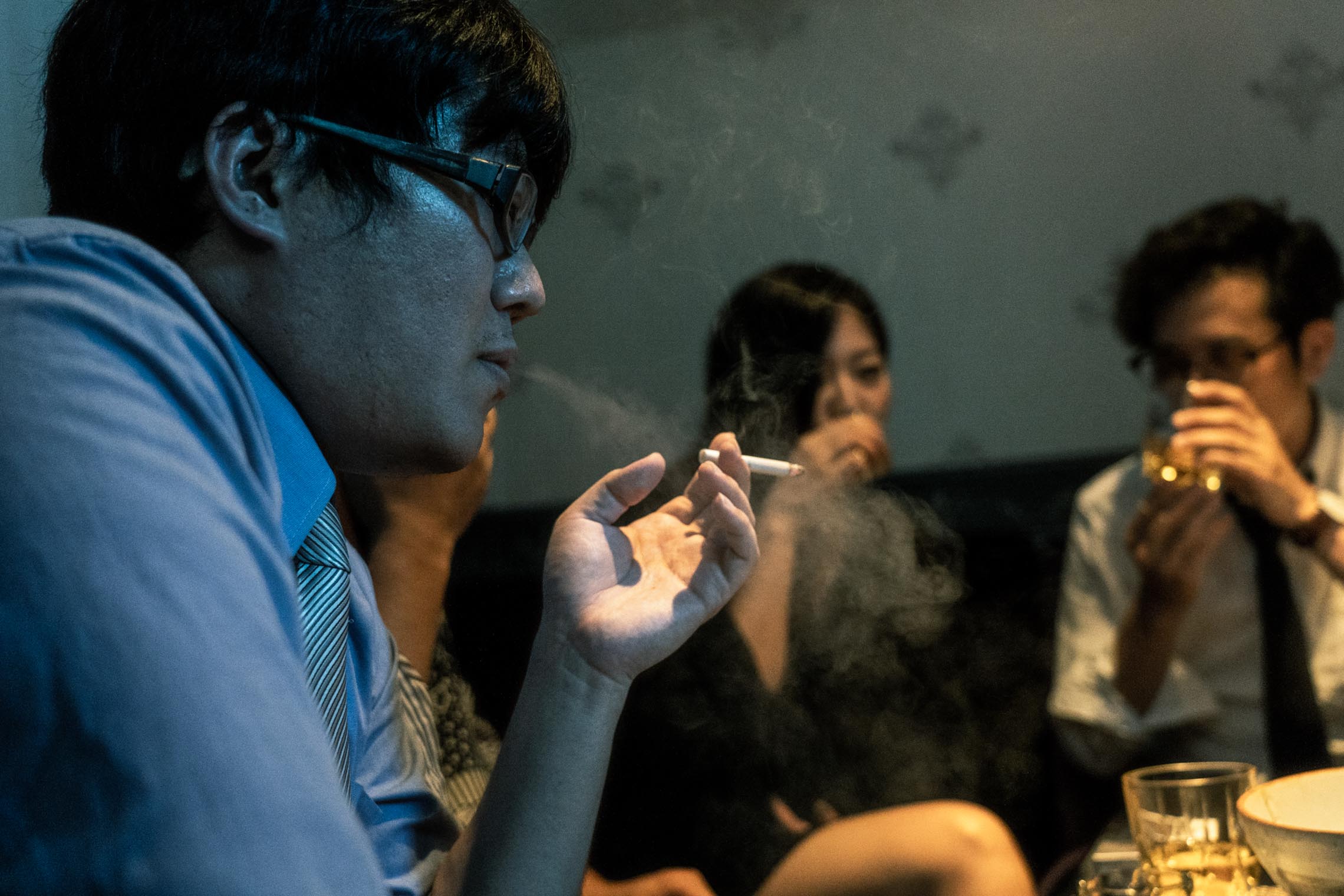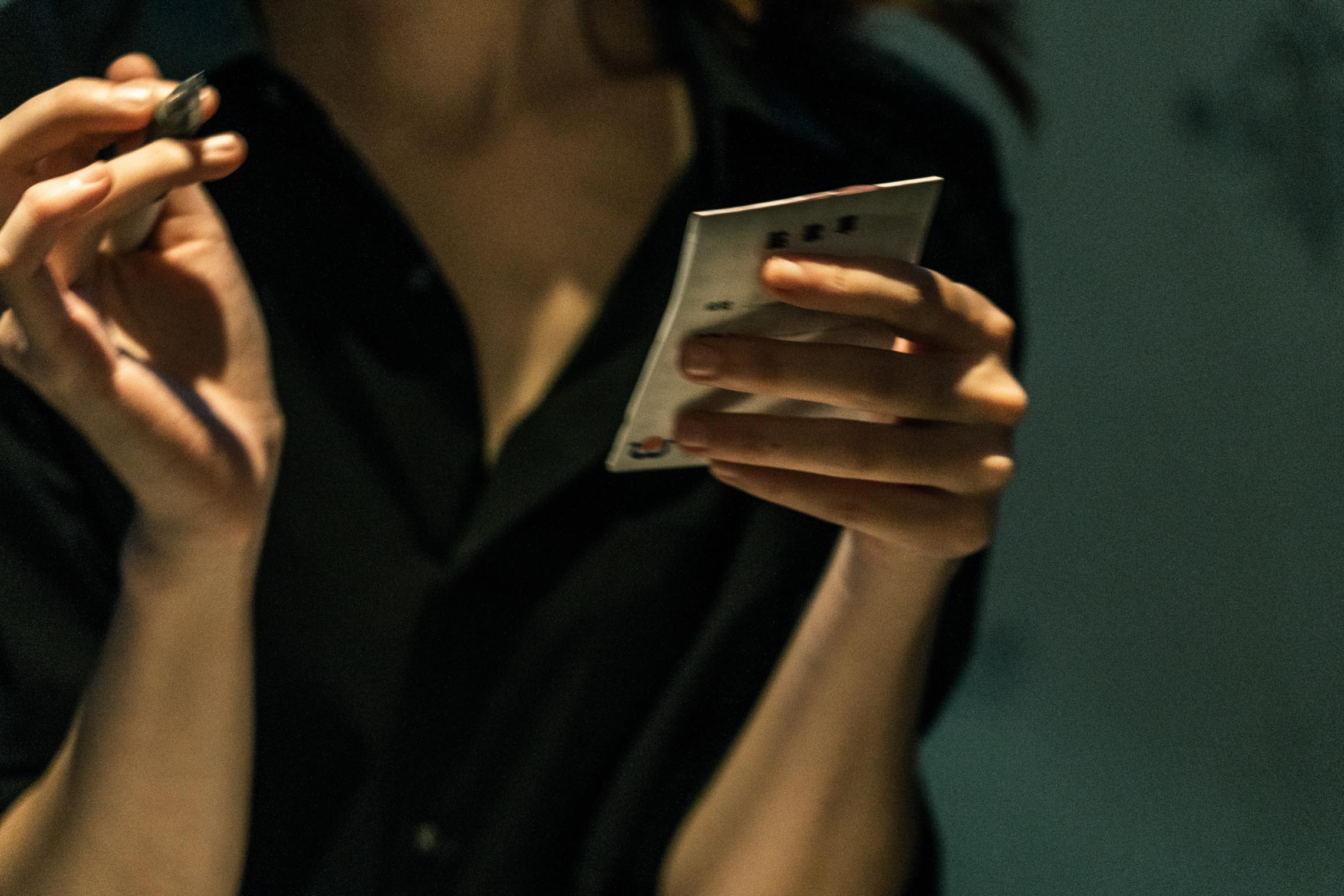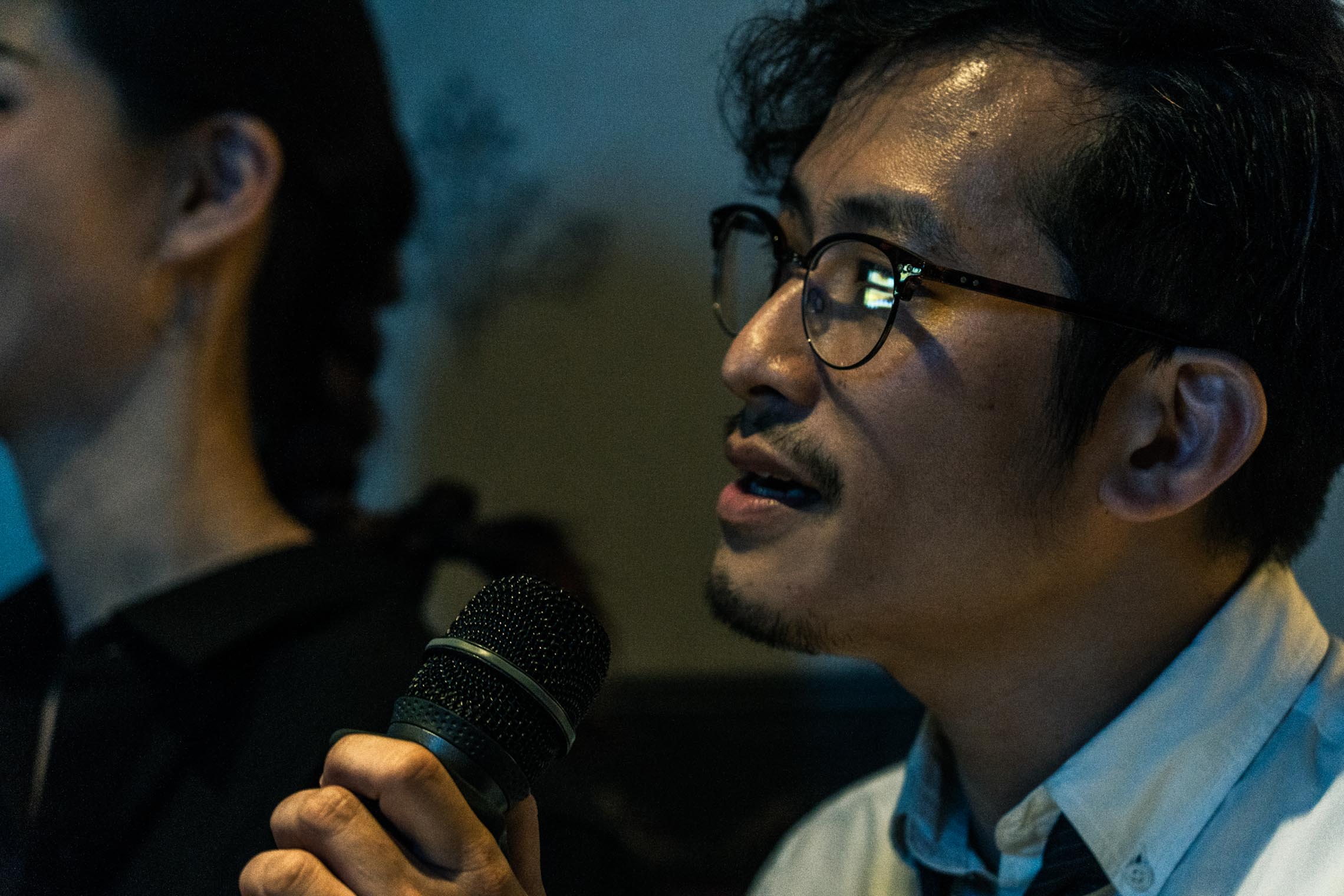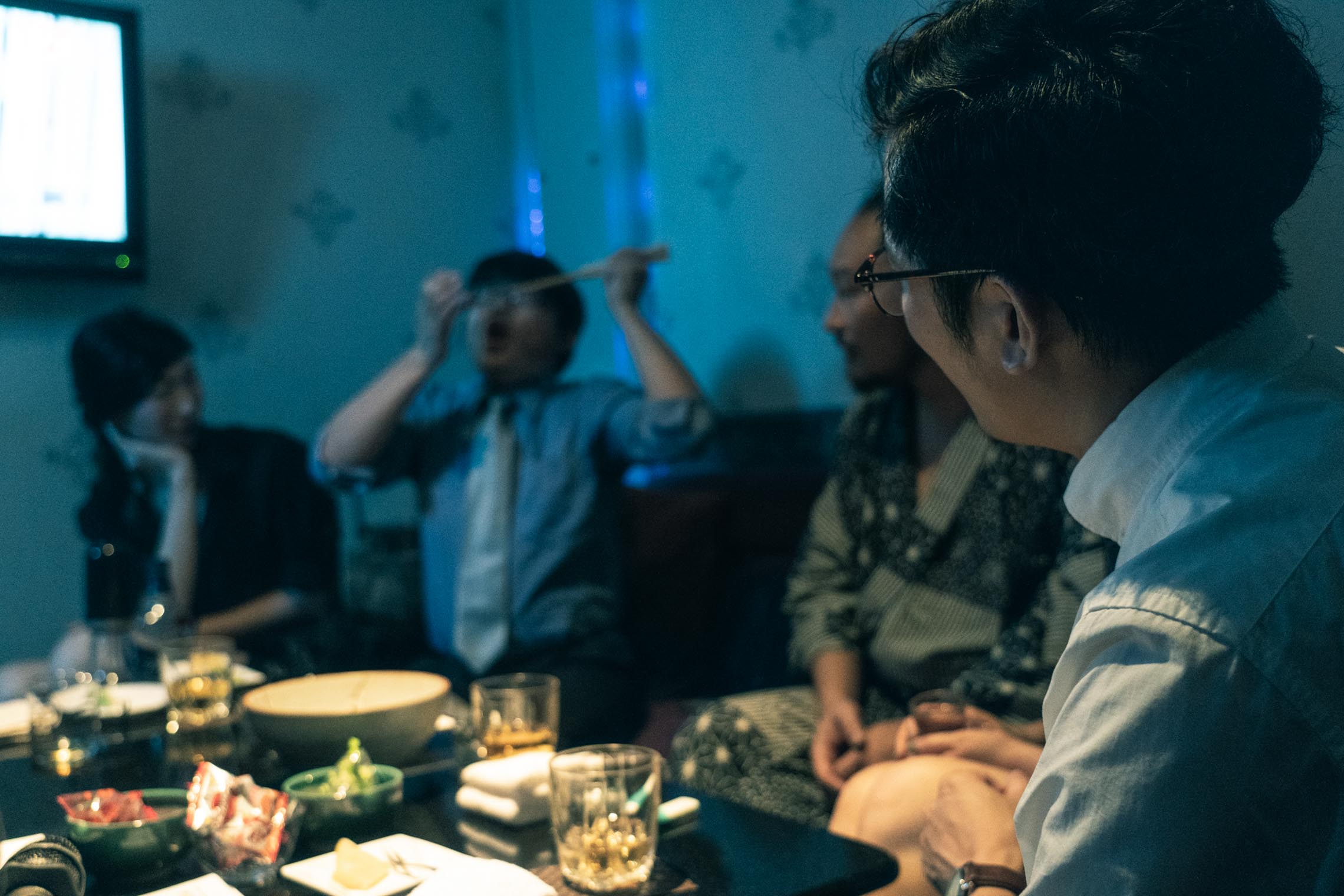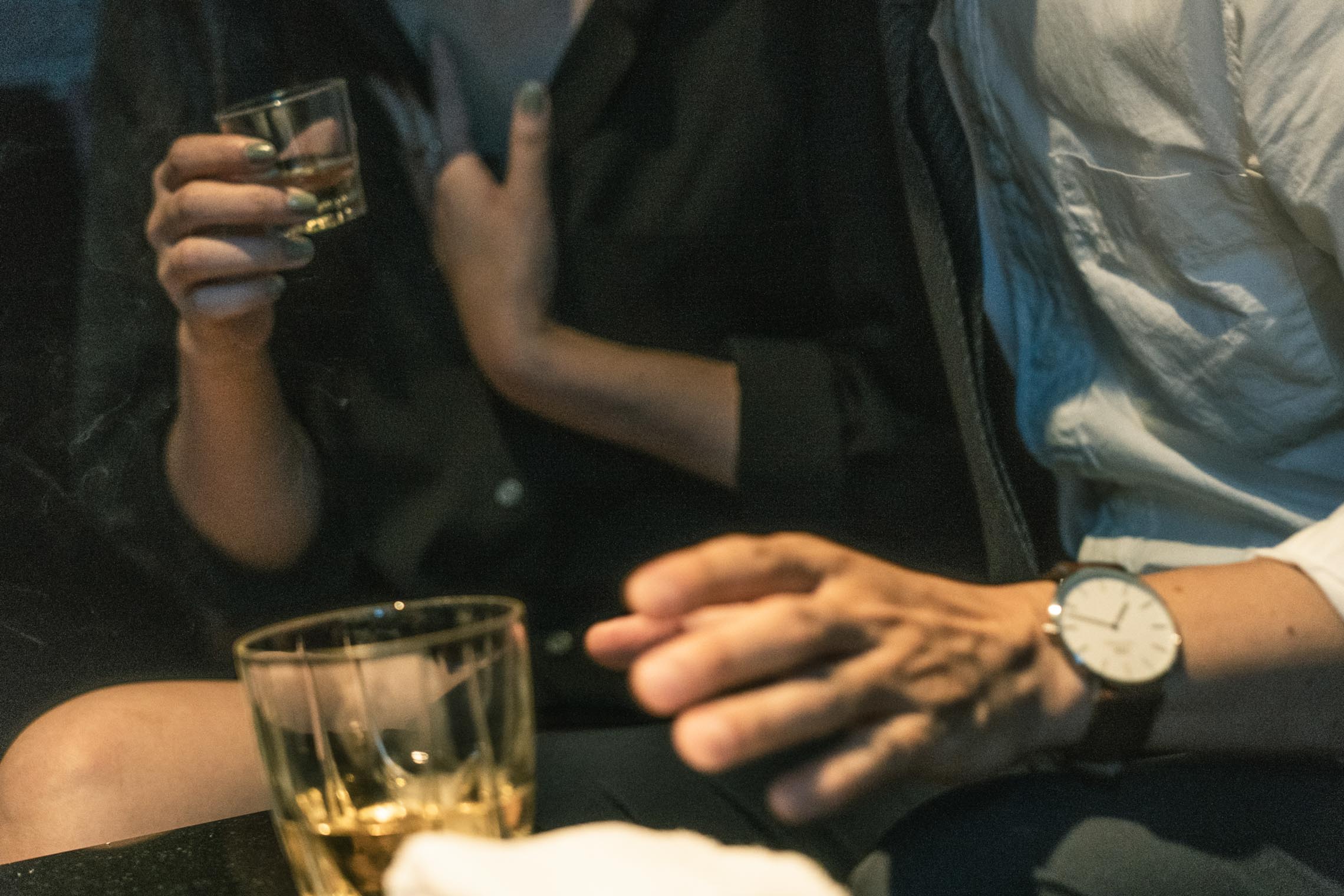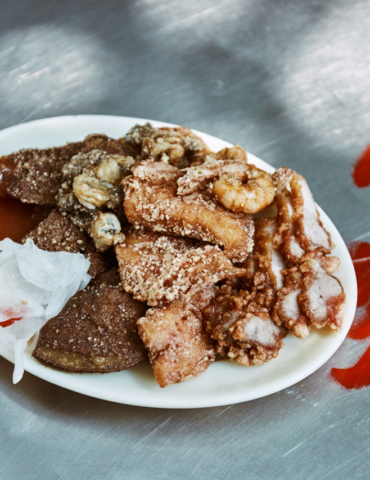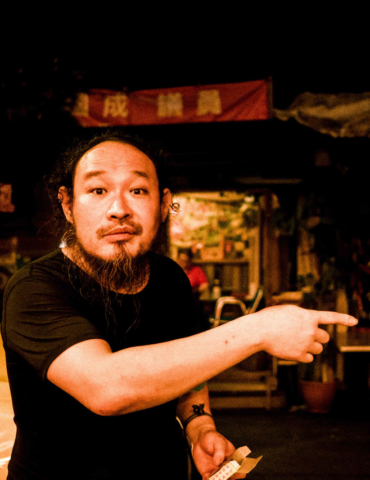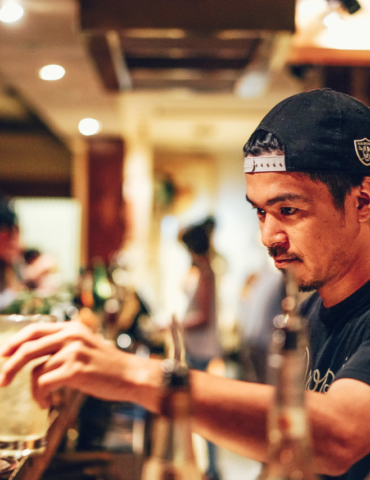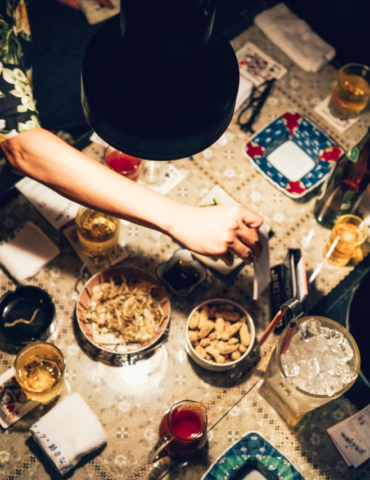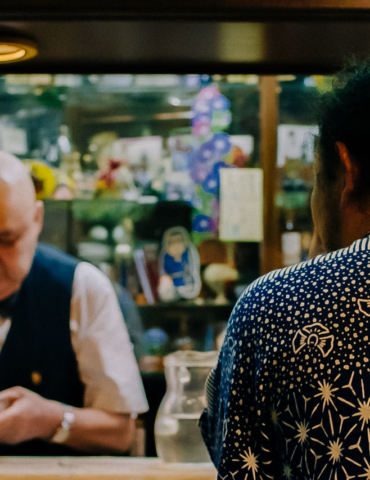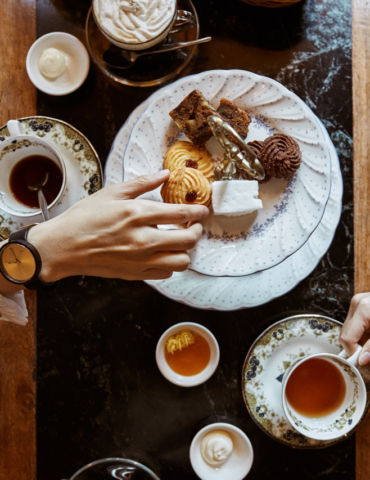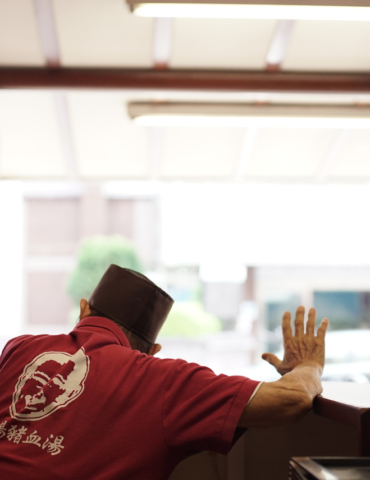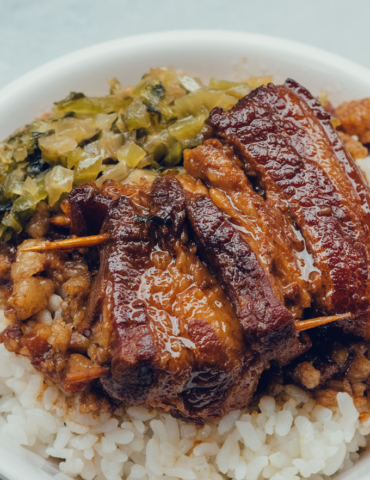撰文 李律昇 攝影 陳志誠 演員 陳希文・林派・駱乃康・小橋川貴之・戴開成
我跟朋友B曾經一時興起地跑到京都去放蕩了七天,本來對吃喝就沒再節制的我們,在日本更是變本加厲地成為了享樂主義分子,從第一天到第七天,總之先來生啤地過了充滿酒精的每一天,白天在寺廟巡禮,晚上則樂此不疲的闖蕩各種酒吧與居酒屋。
我還記得在先斗町大啖了美味的湯葉料理與日本酒,酒足飯飽的我們執意要走到四條旁的鴨川旁納涼,滿面通紅走起路來搖搖晃晃的我一個踉蹌,差點就跟地面有親密接觸,B哈哈大笑,我一邊扶正了甩歪的眼鏡,一邊跟著哈哈大笑了起來。
我緊緊跟著學長走在林森北路上,沒來由地想起了這段回憶。
私と友Bは気まぐれで京都に七日間ぶらぶらしたことがあり、最初から食について制限をしない私達は、日本に着きますます極楽主義になりました。初日から最終日まで、昼間はお寺散策、夜は疲れを忘れる程様々なバーや居酒屋を歩き回り、ひとまずビールっと言う酒で満喫な毎日でした。
あの日は千斗町で美味な湯葉料理に日本酒、酒と食に満足している私達は、四条の鴨川で寛ぐ事に執着した。顔真っ赤にしてフラフラしている私は、躓いてしまい、もうすこしで地面と深いスキンシップをするとこでした。Bは大笑い、私も歪んだ眼鏡を直しながら笑い出しました。
先輩の後を付いて林森北路に歩んでる間に、こんな出来事をふと思い出しました。
近日某個立夏剛過,小滿未至的夜晚,剛好能有機會與學長一同前往林森北路一遊,但此一緣由說起來實在是稍嫌複雜,我打算就在此略過不提。當然並不是沒有來過林森北路,為數眾多日式飲食店、居酒屋、火鍋店、拉麵店等等,道地的滋味實在是讓在日式文化中浸淫許久的我,總是想要在幾個月中抽出一兩個晚上,來這裡吃喝一番。
近日ある立夏が過ぎ、小満にはまだならない夜でした、たまたま先輩と林森北路に来られる機会がありましたが、なぜこんな機会がある事を説明するのがやや複雑なので、スルーさせてもらいます。特に林森に来た事が無いのでは無く、数沢山な日系飲食店、居酒屋、鍋屋、ラーメン屋など、本格的な味はこの日本文化に耽ている私に何としてでも、一か月に一晩二晩位はここに来て満喫したいと思わせる。
那天吃的是咖哩飯,是有著柔嫩蛋包、香甜可口的咖哩以及在廚刀下喀滋喀滋作響的現炸厚切豬排的好店,遺憾的是我中午才剛吃過咖哩飯,連續兩餐都吃咖哩飯對我來說實在是困難了點,但畢竟出錢是大爺,在學長斜眼看我叫我去巷口買碗雞肉飯自己吃一吃之前,沒有收入,勒緊褲帶過活的我,還是閉上嘴巴,安靜地吃就好。但真的得說林森北路上的日式料理店實在是道地,即使兩餐都吃了咖哩飯,刺激食慾的香料、偏甜的咖哩口味與滑順的半熟蛋包,還是令我食指大動,半刻鐘的時間,便被我吃個精光。
その日はカレーでした。柔らかいオムレツに、ほんのり甘いカレールー、そしてナイフの下には上げたてでカリカリ鳴っている厚切り豚カツがある良い店。残念ながら昼食にもうカレーを食べたばかり、二食連続でカレーは私にとってはキツイ。ですが金を払う奴は偉い、先輩が細目で私に路地口で鶏肉飯を買わせて自分で食べる前に、収入がなくてもう精一杯の私は、やはり黙って静かに食べることにした。また強調しますが、林森の日本飲食店は本格的だ、カレーを二食連続食べていることに関わらず、食欲を刺激するスパイス、甘めのルー、そして滑らかな半熟スクランブル、食が進みます。あっという間にペロッと食べ尽くしちゃいました。
林森北路的夜,潛藏在與主要道路上垂直的巷子內,內行人用不用林森北路XX巷來稱呼,而是用充滿日式風情的語調,將其喚作─條通。現在,我就要隨著學長的腳步,踏入被稱為台灣的歌舞伎町一番街,風花雪月與酒精的夜之中心,充滿各種誘惑的世界。
在與六條通口稍微看了一下,學長便筆直地前往八條通的日式酒店。走上小小的台階,這是一家外牆有淡色塗裝以及厚重毛玻璃隔音門的店,日式酒店的門都很厚重,不願讓人輕易推開,這不但是為了保護店內客人的隱私不被路上的行人隨意窺視,更是為了營造出一種這裡是安全的的氛圍,雖然難以輕易地推開,卻是比什麼都還要令人放心。
六条口をさっと見たところ、先輩は八条スナックに直入。小さな階段を歩いて上がり、ここは壁にうっすりペンキが塗ってあり、厚めのすりガラスで作られた防音ドアがある店。日本風のスナックは常にドアが厚めに作られ開けにくい、それはお店のお客様のプライバシーを外側の通行人から守る事だけでは無く、ここは安全だっと言う雰囲気を出すためなのです。ドアは開けにくいが、何と言っても落ち着くことです。
彷彿是有感應一樣,在我們正要推開門的那一瞬間,身穿波絲藍底,白紋相間低胸小旗袍的小姐緩緩地為我們拉開了門,並用流利的日語像我們說了一聲:いらっしゃいませ。我對於她似乎預知到我們的來臨一般分毫不差的為我們開門感到十分驚訝,含蓄地點個頭便隨著學長進到了店內,另一名小姐熟捻地把我們引導到了裡面的座位坐下。
テレパシーがあるように、私達がドアを開けようと思いや瞬間に、ペルシャブルーと白紋の縞柄ローカットチャイナドレスを着ている女の子が、ゆっくりとドアを開けてくれました。流暢な日本語で:『いっらしあませ』私達が来る事予想しているようなタイミングでドアが開いた事に対して、驚きを隠せませんでした。恥ずかしそうに頷き、先輩に付いて、店に入りました。もう一人のお姉さんが慣れた接客で奥への席に案内してくれた。
這裡不大,約只有三四十來坪左右,有三大塊約可以容納八人的大型開放式座位區以及數張面對吧台的單人椅。牆上掛著兩面40吋前後的電視,吧檯後面的櫃子上還放著DAM的卡拉OK機。沙發摸起來像是呢絨材質,坐起來非常舒服。穿著小旗袍的小姐待我們坐定之後,很快地為我們送上了擦手的熱毛巾,一邊詢問我們想喝什麼樣的酒。
この空間は決して大きくなく、3-40坪ぐらいで、約三ブロック八人程座れるオープン式の席があり、カウンター向きのシングルチェアが数枚。壁には40インチ程のテレビが二つ掛けてあり、カウンターの後ろの棚にはDAMのカラオケ機器が置いてあります。ソファーは毛布のような素材で、座り心地は凄く良いです。チャイナドレスのお姉さんは、私達が落ち着いた頃に間もなく熱々のお絞りを届けながら、どんなお酒を飲みたいかを聞きに来ました。
總之先開一瓶ㄐㄧㄥㄒㄧˇ。學長很快地就決定了,小姐像是聽到了只有他們倆懂的暗號一般,很快地退到了後台備酒,在這短暫的空檔中,我非得搞懂什麼是ㄐㄧㄥㄒㄧˇ才行,我轉頭用只有兩個人聽得到的音量悄悄地問學長什麼是ㄐㄧㄥㄒㄧˇ,學長抽著菸,氣定神閒地看著我,一點也沒有要回答的意思。
『一先ず<jing shi>を一本。』先輩は素早く決まり、お姉さんは二人だけの暗号を聞こえた様に、躊躇もなく準備に行きました。このお酒を用意している間に、何とでも<jing shi>がどんな物かを知りたい、先輩に振り向き、二人だけのボリュームでこっそり先輩に<jing shi>は何か聞きました。先輩はタバコを吸いながら、ゆったり顔で私を見上げ、ちとっも答える気は無かったです
小姐很快地就端著酒與杯子走出來,少爺也跟在後面為我們放下餅乾與水果切盤。小姐說她叫做ヒカル。她面帶笑容,一一詢問我們的飲酒習慣,手則流暢地將我們用過的毛巾仔細地對折再摺三折放到了一旁。
她開始著手為我們調製那杯屬於我們的酒,學長說要加冰就好,ヒカル在寬口的威士忌杯中放入了一顆圓冰,從公杯中緩緩地倒入威士忌,再用細長的叉匙輕輕地攪拌,動作非常柔順,冰塊順著酒的杯壁旋轉,一點都沒有傷到冰塊,最後輕輕地把叉匙提起,稍微停頓了一下,將酒杯端給了學長。
ヒカル笑著告訴看呆的我關鍵就是最後停頓的那一下(這裡困難的地方就是我也不知道到底為什麼關鍵))
お姉さんは直ぐお酒とグラスを持ってきて、ボーイは後ろに付きおやつとフルーツを持って来てくれました。お姉さんの名はヒカルさん。彼女は笑顔で私達のお酒の癖を一つ一つ聞きに来て、手慣れた手付きで、私達が使ったお絞りを丁寧に畳、横に置きました。
そして私達のお酒を作り始めました、先輩はロックだけで良いと言い、ヒカルさんは広口 のウィスキーグラスに一粒丸氷を入,コップかれからゆっくりウィスキーを注ぎ、細長いバースプーン で軽く混ぜます、氷はグラスに沿ってかき混ぜ、ちっとも氷が傷つく事が無い、仕上げにバースプーンを少しを持ち上げ、そしてちょっと動きを止めてから、先輩にグラスを渡しました。
ヒカルさんは疑問でぼんやりしている私に『この間が肝心なんですよ』と笑いながら言いました。(ここで一番難しい所は、なぜ肝心なのかが分からない)
等我們的酒都做好了之後,ヒカル端起小姐用的杯子向我們敬酒,比起我們寬口的威士忌杯,小姐的杯子幾乎只有茶杯那麼小,我好奇地問這是怎麼一回事,她一邊重新為我們斟滿酒,一邊輕快地說因為我們必須喝很多酒,小姐的杯子小小的,不但敬酒的時候好看,喝的量也比較少,而且,有些客人會在乎說小姐怎麼喝了這麼多酒,畢竟酒不便宜,我們用小小的杯子喝,客人也比較不心痛。
以此作為契機,她開始告訴我好多有趣的事。
私達のお酒が作り終え、ヒカルさんはお姉さん用のグラスを上げ、乾杯をしました。うち等の広口グラスと比べ、ヒカルさんのグラスは茶ゴップ位で、この差はどう言う事か聞きました。私達のお酒をまた満杯に注ぎながら、軽く『私達は沢山飲まなきゃいけない』っと答えました。コップが小さい方が、乾杯する時に見た目も良いし、飲む量も減る、それに、お客様は『何故お姉さんはそんなに飲む?』とも聞きます、何故なら、お酒は安い物では無い、小さいグラスで飲む方が、お客さんも痛まない。
これを切っ掛けに、ヒカルさんは沢山面白い話を言い出しました。
對於太過年少的我來說,ヒカル怎麼樣都算是姐姐,而她也不諱言地告訴我,一般日式酒店的小姐年紀都比較大些,因為服務的客群不同呀,來我們這裡的顧客,很多都是被外派的高階主管,五六十歲的伯伯,跟台式酒店中二十來歲的小妹妹肯定會有代溝的,但若是跟三十歲上下的的我們,相對就有比較有話題;哎呀,這些紙條是用來點歌的喔,你想唱唱歌嗎?不過我們這裡是公檯,唱歌所有人都聽得到喔,有的時候跟日本客人聊天的時候,點歌單也是很好的小幫手,語言不通的時候寫寫字就能溝通了,我們也會在上面寫你們的名字,這樣待會來的小姐馬上就會知道囉…
若過ぎる自分にとっては、ヒカルさんはどう見てもお姉さんです。彼女も避けなく、スナックのお姉さんは通常年齢層が高い事を教えてくれました。ここに来られるお客様は、派遣の上位監督者が多く、5.60歳のおじさんです。台湾式キャバクラの20代の子達だと確実にジェネレーションギャップがあるでしょう。ですが30代前後の私達でしたら、比較的に話題がある。あら、このメモは曲のオーダーの為よ、何か歌いたい?でもここオープンだから、みんな聞こえるわよ、場合によって日本客とお喋りをしている時は、曲のオーダーも良いヘルプ、言葉が通じない時は字を書けば会話が出来る。メモにもあなたの名前を書くので、後で来るお姉さんも直ぐ分かる様になります。
電視放著李榮浩的新歌,但我腦中的旋律全是五月天的溫柔。大概是學長抽到第三根菸,我喝到第五杯酒的時候,我跟ヒカル的肢體接觸已經比一開始更近了些,我稍微靠著她,漫不經心地看著香菸煙霧裊裊地上升,透著天花板惟一一盞燈模糊了現實的界線,我開始不太在意學長跟ヒカル到底在說些什麼,大人的話題與我完全無關,少年只想將杯中的威士忌一飲而盡,脫下長日的假面,任我醉倒在池邊。
テレビには李榮浩(リーロンハウ)の新曲が流れてるが、私の中ではMAY DAYの<溫柔>です。先輩の煙草は三本目になり、私が五杯目辺りの頃は、私とヒカリさんのスキンシップも最初より近寄りました、ちょっと寄し掛かっている状態です。うっとりとタバコの煙が上がって行くのを見上げ、天井をに釣り下がっている唯一のランプが現実との境界線をぼやける。先輩やヒカルさんが何を言ってるのかもう気になら無くなり、大人の話は私に関係ない、少年はただただグラスのウェイスキーを飲み乾したいだけ、普段の仮面を脱ぎ捨て、池沿いに酔い倒れた。
大約是喝到第七杯,還是第八杯?我有點醉,已經記不太清楚了,學長拍拍我說差不多要去下一攤了,我搖搖晃晃地站了起來,貪婪地將桌上的水一飲而盡。ヒカル送我們出店門後朝著我們深深一鞠躬,請我跟學長務必再次光臨。我有點搖搖晃晃,被水溝上的突起絆了一跤,我用力搓搓臉,重新戴好不小心甩掉的眼鏡,狹窄的街道上滿溢著俱樂部的招牌,日式風情的建築,燈籠柔和的光映著微醺的酒客,人來人往卻沒有大道上的喧鬧,這種感覺,是先斗町。
七杯目か八杯目かもう酔っているので覚えが無い、先輩は私を軽く叩き、そろそろ次ぎへ行く事を言った。私はふらふらと立ち上がり、欲張りに目の前の酒を全て飲み乾した。ヒカルさんはお見送りをしてくださり、私達に深いお辞儀をした。是非また先輩とお越しになって下さいと言われた。私はちゃんと歩けず、マンホールの凸凹で躓いてしまった、思いっきり顔を擦り、ぶっ飛んだ眼鏡を掛け直した。狭い道にはクラブの看板でいっぱい、日本風の建物、提灯の和らげな光がほろ酔いの客を照らす、人が行ったり来たりしていても、大通りの騒がしは無い、これこそ先斗町。
原來不是歌舞伎町一番街,是京都四條,我踉蹌摔跤的先斗町,在這不算寂靜的夜晚,耳邊彷彿還是能聽見遠在兩千公里鴨川的潺潺流水。我用不至於跌倒的速度,緊緊跟著抽著菸,腳步飛速向前的學長離開了八條通,通過中街又轉了好幾個彎,不勝酒意的我早已迷失在這五木林中,任憑學長往前走,我挨各跟著就是了。
學長突然停在攤販前向小販買了一盒檳榔,愉快地問我想不想試看看,我不甘示弱地跟他說好啊,便接過丟給我的檳榔,一邊放進口中,隨著他走進第二攤的酒吧。
ここは歌舞伎町一番街では無く、京都の四条でした。よろめき転びの先斗町で、決して静かでは無い夜には、まるで2千キロ遠い鴨川の川の流れの音が聞こえる様です。転ぶ程では無いペースで、タバコを銜えていて足が速い先輩の後を追い、八条を離れました。中条を通りまた何回も曲がり、酔い尽くした自分はもうこのジャングルの中から気を失い、先輩は自分本位に歩いて、私も付いて行くしかなっあたです。
先輩は急に露店の前に止まり、檳榔を買った、愉快に試を誘い、私も負けず嫌いにオーケーして、投げてきた檳榔を受け取り、口に入れ、二件目のバーの方向に付いて行った。
– 全文完 –
西城帶路 通のこだわりポイント
1.日式酒店的消費方式 ,每個入場的人頭費在一千元至一千五百元之間不等,開酒費用則為五千元起跳,若是這次沒有喝完可以寄著留待下次享用。日本式バー(スナック)の支払い方は、一人入場で約1000元から1500元の間です。持ち込み料金は5000元からです、飲み乾せない場合は次のお楽しみでキープ。
2.這裡有賣體貼,與你一同聊天、歡笑時,相信你也會注意到酒杯拿起來沒有水漬,從洗手間回來後總有一條熱騰騰的毛巾,以及隨時為你點菸的那雙手。ここでは優しさを売っています。一緒にお喋りして、笑っている時には、グラスにはしみが無く、お手洗いから帰ってきた時には遂に暖かいお絞りが待っている、そしていつでもタバコに火を点けてくれるあの両手。
3.日式酒店凌晨一點打烊,節制的令人感到意料之外,適度地享受在酒精陪伴之下和小姐聊天的曖昧與歡愉後踏著子時的夜回家,這才是夜之帝王該有的風範。スナックは深夜1時に閉店、節制のある事が予想外ですが。適度なアルコールの中でお姉さんとの会話の曖昧と嬉しさ御供にして、12時の夜を踏み歩く、それこそ夜の帝王にあるべき風範だ。
Capturing the glimmering moment
My friend B and I once went to Kyoto for seven days on a whim. We are the kind of people who don’t control our diet, so while in Japan, we became even more hedonistic. From the first day to the seventh day, we first had a draft beer, and enjoyed alcohol for the rest of the day. In the day time, we visited temples, while at night, we indulged ourselves endlessly at bars and and izakaya restaurants.
I still remember the delicious tofu skin dish and Japanese sake at Pontocho. We had a nice feast and insisted on going to the Kamogawa River near the 4th lane to take a rest. I, with both cheeks flushing from alcohol, staggered and almost fell on the ground. B laughed loudly at me, as I adjusted my crooked glasses and laughed along with him.
I followed my senior along the Linsen North Road, and this memory occurred to me for no reason.
Recently, a night just after the Beginning of Summer and before the Grain Full, I had an opportunity to go to the Linsen North Road together with a senior of mine. But the reason is complicated, and I’d rather not to mention of it now. Of course, it was not my first time walking on Linsen North Road. There are numerous Japanese restaurants, izakaya restaurants, hot pot restaurants, ramen restaurants, etc. The authentic Japanese food really appealed to me, who had always been immersing in Japanese culture. I’d always wanted to take one or two nights in a few months to eat and drink there.
That day I had curry rice. The restaurant provided soft omelets, sweet and delicious curry sauce and crunchy fried pork chop. Unfortunately, I had just eaten curry rice at noon that day. It was really difficult for me to eat curry rice for two meals, but after all, whoever paid was the boss. Since I had no income, before my senior squinted at me and asked me to go to the alley to buy chicken rice, it was better for me to just eat. But I really have to say that the Japanese restaurant on the Linsen North Road is authentic. Even though I had curry rice for two meals, I couldn’t resist the spices that stimulated my appetite, the sweet curry, and the smooth, half-cooked omelet. I finished the curry rice within a quarter of an hour.
The night of Linsen North Road was lurking in the lanes perpendicular to the main road. The insiders do not call them Lane XX of Linsen North Road. Instead, they speak of them in Japanese tone, calling them “Tiaotong”. Now, I’m going to follow my senior and step into the “Kabukicho Street” in Taiwan, which is the romantic and alcohol center of the night, full of all kinds of temptations.
After taking a look at 6th Tiaotong cross, my senior went straight to a Japanese-style bar in 8th
Tiaotong. We walked up some small staircases, and found the bar had a light-colored façade coated in frosted glass and a sound-insulating door. The Japanese-style bars always have heavy doors which are difficult to push. This is not only to protect the guests inside from being pried, but it is also to create a safe atmosphere. Although the door is difficult to push, it is more reassuring than anything else.
Just as if they could sense us, at the moment we were about to open the door, a lady wearing Persian blue and white, low-cut cheongsam slowly opened the door for us and said welcome fluently in Japanese. I was very surprised that she seemed to know exactly when we were arriving and greeted us in time. I shyly nodded and followed my senior inside, and another lady guided us to our seat.
The place was not big, only about 30 to 40 pings (100 to 132mm2). There are three large open seating areas that could accommodate eight people respectively and several single chairs facing the bar. There were two 40-inch TVs on the wall, and DAM karaoke machines on the cabinet behind the bar. I guessed the sofa was made of velvet and it was comfortable. The lady wearing a cheongsam waited until we settled, and quickly sent us hot towels to wipe our hands and asked us what kind of alcohol we wanted to drink.
“Let’s have a bottle of ‘Jingxi’ first,” said my senior quickly. The lady seemed to understand the secret code and immediately went back to the bar to prepare. During this short break, I got to figure out what “Jingxi” was. I asked my senior what it was in a very low voice, but he just smoked and looked at me calmly, not having a slight intention of telling me.
The lady soon came out with alcohol and glasses, and a waiter followed to bring us cookies and fruits. The lady said her name was Hikaru. She smiled and inquired about our drinking habits, while her hands smoothly folded the towels in half and then folded three times and put them aside.
She started bartending. The senior said that he would like to add some ice. Hikaru put a round ice cube in the wide-mouthed whisky glass and slowly poured whisky from the lipped glass, and gently stirred with a long, thin spoon. Her action was very delicate, and the ice cube rotated along the wall of the glass without changing its shape. Finally, she gently lifted the spoon, paused a little, and gave the glass to my senior.
Hikaru smiled, telling me that the key was the pause at last, though I didn’t understand why.
After our alcohol was served, Hikaru picked up a lady’s glass and toasted to us. Compared to our wide-mouthed whisky glass, the lady’s glass was almost as small as a teacup. I was curious and asked about it. As she refilled for us, she explained briskly, “We have to drink while serving the customers, so we use small glasses which make us look elegant and also reduce the amount of alcohol. Moreover, some guests would wonder why the waitresses drink so much; after all, the alcohol was not cheap. When we drink with a small glass, guests are less worried.”
She then took the opportunity to tell me a lot of interesting stories.
I was still very young then, so Hikaru was like my older sister anyhow. She told me directly that the ladies working at Japanese-style bars were normally older. “Since many customers here are high-ranking expatriate executives, 50 or 60-year-old men, who would certainly have generation gap with 20-year-old young ladies who worked at Chinese-style clubs. However, ladies in their thirties would have relatively more to talk with them. Oh yeah, the paper is for ordering songs. Do you want to sing? But here we have public stations, so everyone can hear you. Sometimes when chatting with Japanese guests, a karaoke list is also a good helper. When we can’t communicate with each other, we can communicate through writing. We would also write your name on it so that the lady who comes later will know immediately…”
The TV was playing Li Rong-Hao’s new song, but the melody in my head was “Gentle” by Mayday. Probably when my senior got the third cigarette, and when I drank the fifth glass of alcohol, I had more physical contact with Hikaru. I leaned against her slightly and watched cigarette smoke rising inattentively. With the only light on the ceiling blurring the line between reality and illusion, I didn’t care much about what my senior and Hikaru were talking about. The topic of adults had nothing to do with me. The teenager like me only wanted to drink all the whisky from the glass, taking off the mask of the long day and getting drunk beside the pool.
Was it about the seventh or eighth glass? I was a little drunk and I couldn’t remember clearly. My senior patted me and said that it was about time to go to the next bar. I stood up and staggered, greedily drinking the water on the table. Hikaru sent us out and gave us a deep bow, inviting us to visit again. I couldn’t stand still and accidentally tripped by the bump of the ditch. I rubbed my face hard, putting on my fallen glasses. The narrow streets were glimmering with club sign neon. There were Japanese-style buildings, and soft light of lanterns reflected on the tipsy guests. People were coming and going but there was no bustle on the boulevard. This is Pontocho.
It turned out that it wasn’t on Kabukicho Street, but at Pontocho on Kyoto Shijo that I tripped myself. On this not-so-quiet evening, I could hear the water running from Kamogawa River 2,000 kilometers away. I walked as fast as I could and managed not to fall over. I followed my senior who was smoking and moving forward quickly from the 8th Tiaotong. We went past Middle Street, and he turned several times. I, who was already drunk, got lost in this maze, so I let my senior lead the way and I just followed.
My senior suddenly stopped at a vendor and bought a box of betel nuts. He asked me happily if I wanted to try. I was unwilling to show any sign of weakness, so I took the betel nuts and followed him into the second bar.
– The end –
Suggestions
1. For Japanese bars, the entrance fee is between 1,000 and 1,500 NTD and the corkage fee is 5,000 NTD. If you cannot finish the bottle, you can store it there and have it on the next visit.
2. Japanese bars provide you with care. When chatting and laughing with you, I believe you will also notice that there is no water stain on the glass. After returning from the bathroom, there will always be a hot towel and someone is always there to light up your cigarette.
3. Japanese bars close at 1 o’clock in the morning. It was surprisingly moderate. After modestly enjoying the night with alcohol and the company and nice chatter of a young lady, customers go back home. It is how a gentleman enjoys the night.
日譯 程柔淳 英譯 陳姿岑
核稿編輯 鄭婷文


